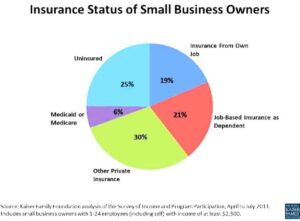
Health insurance for small business. Providing health insurance for your small business is a strategic decision with significant advantages. This detailed guide delves into everything you need to know, from understanding the benefits to choosing the right plan and navigating the enrollment process.
Why Health Insurance Matters for Small Businesses

Offering health insurance goes beyond just employee benefits; it’s a key factor in your company’s success. Here’s how:
Attract and Retain Top Talent: Competitive benefits packages are a major draw for qualified candidates. Health insurance demonstrates your commitment to employee well-being, making your company a more attractive place to work. You can find data on employee benefits and their impact on recruitment on the Society for Human Resource Management website: SHRM
Boost Employee Morale and Productivity: Knowing they have healthcare coverage reduces stress and financial worries for your employees. This translates to increased morale, improved focus, and higher productivity.[health insurance for small business]
Tax Advantages: The good news is that small businesses can deduct the entire cost of employee health insurance premiums, lowering their taxable income. For more information on small business tax deductions, refer to the Internal Revenue Service website: IRS (.gov)
Understanding Small Business Health Insurance Options
Small businesses typically secure health coverage through group health insurance, unlike individual plans. These plans cover a group of employees under a single policy, often at a lower cost per person. Here are the two main ways to obtain a group health insurance plan:
- The Health Insurance Marketplace (SHOP): Established by the Affordable Care Act, the SHOP provides a platform for small businesses (typically with 50 or fewer employees) to compare plans from various insurers. You can find details and locate your local SHOP exchange on the official Healthcare.gov website: Healthcare.gov
- Directly from an Insurance Company: Many insurance companies offer group health plans specifically designed for small businesses. Researching and comparing plans directly with insurers gives you more control over the selection process.[health insurance for small business]
Choosing the Perfect Plan for Your Team
Finding the ideal health insurance plan requires careful consideration of several factors:
- Employee Needs: Understanding your workforce’s demographics and health needs is crucial. Younger employees might prioritize lower premiums, while older employees or those with families might require more comprehensive coverage.
- Network of Providers: Accessibility is key. Ensure the plan offers access to a network of hospitals, doctors, and specialists that are conveniently located for your employees. You can find resources to compare provider networks on insurance company websites.
- Cost: This involves a balancing act. Compare premiums (monthly payments), deductibles (amount paid out-of-pocket before insurance kicks in), copays (fixed fees for doctor visits or prescriptions), and out-of-pocket maximums (the most an employee spends in a year) to find a plan that fits your budget and employee needs. Tools for comparing plan costs are often available on insurance company websites or through brokers (see below).
- Benefits: Look beyond basic medical coverage. Some plans offer additional benefits like preventive care coverage (annual checkups, vaccinations), wellness programs (smoking cessation, gym memberships), or vision and dental insurance. Explore these options to understand their value for your employees.[health insurance for small business]
Additional Considerations for Small Business Health Insurance
- Tax Credits: The Small Business Health Care Tax Credit can significantly offset the cost of providing health insurance to your employees. Learn more about eligibility and how to claim this credit on the IRS (.gov) website: IRS (.gov)
- Association Health Plans: These plans allow small businesses to join together to purchase health insurance, potentially offering greater bargaining power and potentially lower premiums. The Department of Labor website provides information on Association Health Plans: DOL.gov
Taking Action: Getting Started with Health Insurance for Your Small Business
- Consult a Broker: A qualified insurance broker can be a valuable asset. They can assess your needs, compare plans from different insurers, explain complex terms, and guide you through the enrollment process. You can find brokers in your area through professional organizations like the National Association of Health Underwriters: NAHU
- Educate Your Employees: Once you’ve chosen a plan, provide clear and concise information to your employees. This includes details about their coverage options, enrollment process, contact information for customer service, and claim procedures.
By offering health insurance, you’re not just providing a benefit, you’re investing in the health and well-being of your most valuable asset – your employees. With careful planning and the right resources, you can find a health insurance plan that meets your needs, keeps your team healthy and happy, and positions your business for long-term success.[health insurance for small business]
FAQ
- Is my small business required to offer health insurance?
In most cases, no. However, there may be state-mandated requirements depending on your location and number of employees.
- What are the benefits of offering health insurance to my employees?
There are numerous benefits, including attracting and retaining top talent, boosting employee morale and productivity, and tax advantages for your business.
- How much does small business health insurance cost?
The cost varies depending on factors like your location, number of employees, chosen plan, and employee demographics. However, there are tax credits and other strategies to help manage affordability.
Enrollment and Plan Selection
- How do I choose the right health insurance plan for my small business?
Consider employee needs, network of providers, cost (premiums, deductibles, etc.), and offered benefits like preventive care. Consulting a broker can be helpful.
- What is the Health Insurance Marketplace (SHOP)?
The SHOP is a platform for small businesses to compare plans from various insurers and potentially qualify for tax credits.
- Can I enroll my employees’ dependents in the plan?
Yes, most group health insurance plans allow you to extend coverage to dependents, though there may be additional costs.
Plan Details and Management
- What are deductibles, copays, and out-of-pocket maximums?
The deductible is the amount you pay out-of-pocket before insurance kicks in. Copays are fixed fees for certain services. The out-of-pocket maximum is the most an employee pays in a year.
- What happens if an employee leaves the company?
Their health insurance coverage under the group plan will typically end. However, they may be able to continue coverage under COBRA (Consolidated Omnibus Budget Reconciliation Act).
- How can I educate my employees about the health insurance plan?
Provide clear information about coverage options, enrollment procedures, and resources for customer service and claims.






